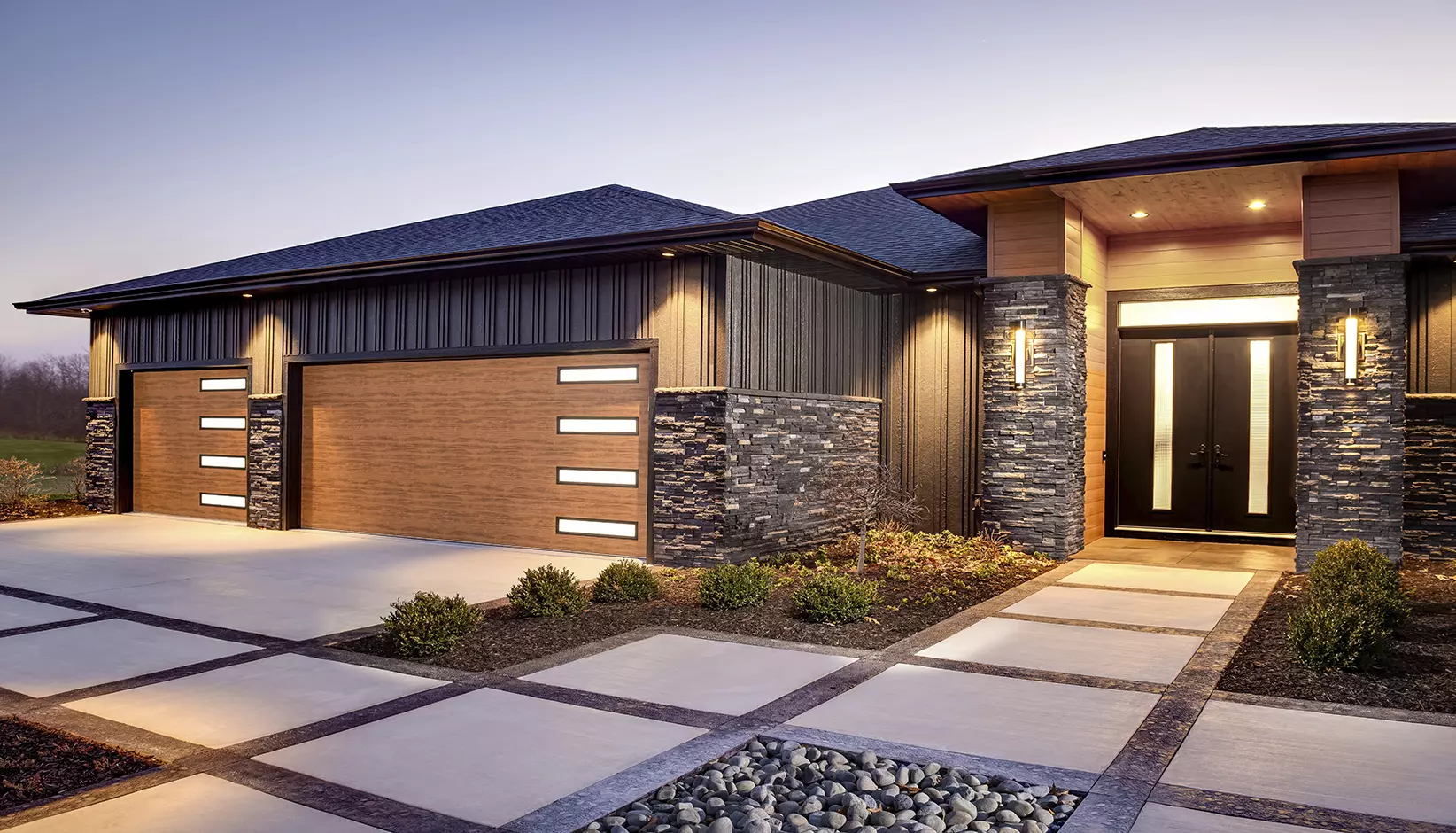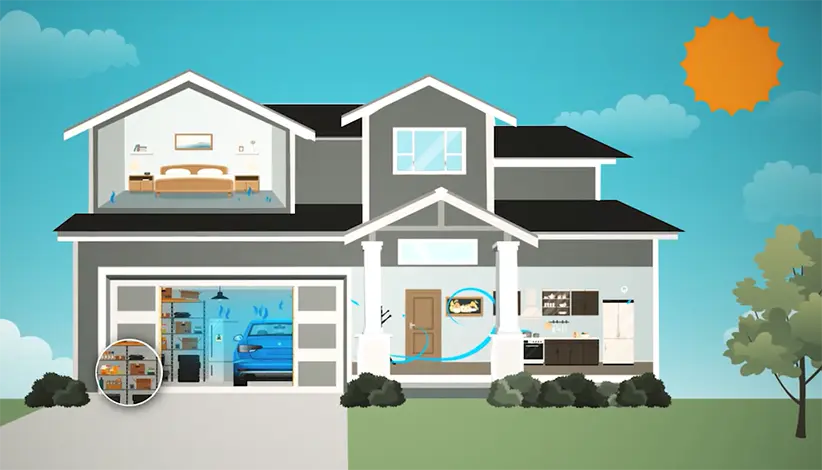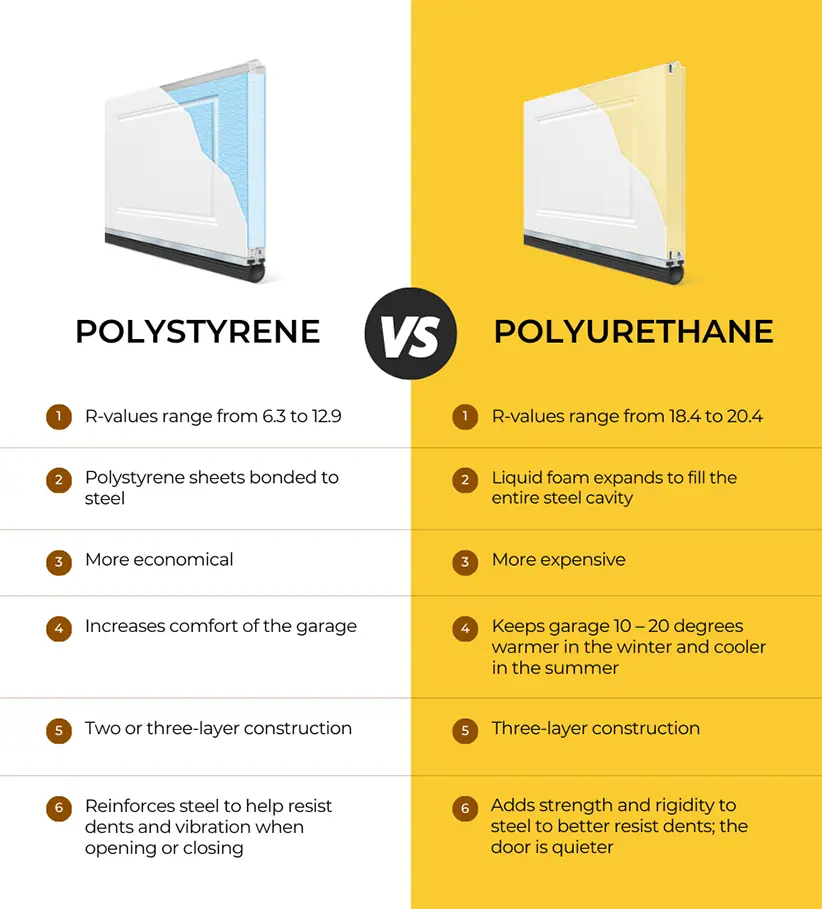Guide to Insulated Garage Doors

For many homeowners, the garage is one of the primary entrances of the home. It is often also the largest entrance on your home’s exterior. Because of this, the garage can be one of the biggest problem areas for heat loss in your home, impacting your home's energy efficiency.
The best way to reduce heat loss through your garage is to install an insulated garage door. Along with increased energy efficiency, garage door insulation offers additional benefits, such as quieter operation and increased overall door strength and durability.
Benefits of Garage Door Insulation
Reduced Heat Loss Through Your Garage
An insulated garage door prevents heat from escaping through your garage in the winter, meaning it may require less energy to heat your home. In warmer seasons or climates, insulation prevents excess hot air from getting into your garage, meaning lower cooling costs and increased comfort while using your garage.
It's like adding an additional room to my house. The 2 inch insulation provides all the comfort necessary during all four seasons
I get the full afternoon sun so good insulation is a must
Allen, PA - Classic Collection

Because many garages are connected to the rest of the home (often called attached garages), this can have a big impact on your home's overall comfort. For example, many garages lead into a high-traffic area of your home like a hallway or kitchen, or there are rooms above the garage. As the image here represents, this makes it easy for cold air to spread throughout the home in the winter as it enters through your garage. This will inevitably happen as you use your garage, but choosing a garage door with insulation minimizes heat loss that occurs even while your garage door is closed.
Want to see the impact for yourself? One homeowner put their new Clopay® insulated garage door to the test to see firsthand the difference insulation can make. In the figures below, the homeowner compared their old non-insulated garage door to a door with Clopay® Intellicore® insulation.
Before Clopay® Insulated Garage Door
| Date | Time | Temperature Inside Garage | Outside Temperature | Difference Inside Garage |
|---|---|---|---|---|
| January 17th | 8:30 PM | 53° | 34° | 19° warmer |
| January 20th | 10:00 PM | 48° | 37° | 11° warmer |
| January 21st | 12:30 PM | 47° | 20° | 27° warmer |
| January 24th | 5:00 PM | 36° | 10° | 26° warmer |
| Average | - | 46° | 25° | 21° warmer |
With Clopay® Intellicore Insulated Garage Door
| Date | Time | Temperature Inside Garage | Outside Temperature | Difference Inside Garage |
|---|---|---|---|---|
| January 25th | 10:00 AM | 44° | 2° | 42° warmer |
| January 27th | 10:00 PM | 54° | 2° | 52° warmer |
| January 28th | 7:30 AM | 47° | -7° | 53° warmer |
| January 29th | 7:30 PM | 43° | -5° | 48° warmer |
| Average | - | 47° | -2° | 49° warmer |
Clopay® garage door with Intellicore® insulation installed by EZ Garage Doors & Home Exteriors, North Versailles, PA.
Better Sound Insulation
Insulation also means your garage door operation will be quieter. The figures below represent the difference in decibel levels between a non-insulated garage door and a residential garage door with Clopay® Intellicore® Insulation technology.
| Non-Insulated Garage Door | Garage Door with Clopay Intellicore Insulation | Comparison | |
|---|---|---|---|
| Sound Volume (dB) | 96dB | 80dB | Approximately 3x quieter |
Sound Volume (dB)
Non-Insulated
Garage Door
96dB
Garage Door with
Clopay Intellicore Insulation
80dB
Comparison
Approximately 3x quieter
Comparing Insulated Garage Doors
If you are shopping for a garage door with insulation, you may see a few different numbers provided that measure the effectiveness of the insulation. Here is a brief definition of each:
R-Value: A garage door's R-value represents its ability to slow the transmission of heat. A higher R-value means a slower transmission of heat, which means less cold air leaking into your garage in the winter and less heat invading your garage in the summer. When it comes to R-values for garage doors, the higher the better!
R-value is the most widely used measurement for a garage door's energy efficiency. Clopay® uses door section R-value's for our garage door insulation testing, which is in accordance with the Door and Access Manufacturers Association guidelines provided in TDS-163. Clopay garage door R-values depend on the door's thickness, material and type of insulation, and range from 6.3 to 20.4. See each Collection or sell sheet for options.
U-Factor: Though not used as often as R-value, U-factor is another number you may see when shopping for a garage door. U-factor represents the flow of heat through a material, meaning the lower the U-factor, the better. Because these are not used across all residential garage door manufacturers, Clopay's energy efficiency calculations instead currently focus on R-value.
Polystyrene Vs. Polyurethane Garage Door Insulation
Insulation is an important consideration when you are buying a garage door. The higher the R-value, the more thermal protection the door will provide to keep your garage comfortable in hot or cold weather. This is especially important if your garage is attached to your house and you have living space above it.
Polystyrene and polyurethane are the two most common types of garage door insulation. To compare doors and fully understand which is best for your home, knowing the difference between the two is necessary.

Polystyrene Garage Door Insulation
Polystyrene insulation is used in many garage doors and is the type of insulation offered in aftermarket garage door insulation kits sold at major retailers. This insulation comes in the form of rigid panels of polystyrene that are inserted between steel layers of your garage door or placed inside of your single-layer garage door and typically includes a vinyl back.
Garage doors insulated with polystyrene sandwiched between two steel layers will have a quieter operation and energy efficiency than a non-insulated door, however, they are not as energy efficient as foam injected polyurethane.
Polyurethane Garage Door Insulation
Polyurethane insulation is a liquid foam injected between two steel skins that expands to fill the space completely. It hardens, resulting in a rigid, durable garage door that is going to resist dents and dings better than an uninsulated door.
You’ll notice the door is very quiet and doesn’t vibrate when it opens and closes. You’ll also feel the difference in temperature – anywhere from 10 to 20 degrees -- inside the garage. Polyurethane insulated doors are available in a three-layer construction (steel + insulation+ steel). They have higher R-values and cost more than polystyrene doors.
Garage doors with polyurethane insulation will provide the highest level of sound isolation and climate control, and are a great choice if you live in very cold or hot climates and your garage door is used as the primary entrance to your home.
Whatever your budget, an insulated door is a smart investment in the long-term durability, security and energy efficiency of your home.
Below is a breakdown of which insulation types are available for Clopay® garage door collections:
| Collection | Series | Polystyrene Insulation Available | Intellicore® Polyurethane Insulation Available |
|---|---|---|---|
| Canyon Ridge | 5-Layer | - | 2" Intellicore® insulation with thermal break |
| Canyon Ridge | 4-Layer | - | 2" Intellicore® insulation with thermal break |
| Canyon Ridge | Modern | - | 2" Intellicore® insulation |
| Canyon Ridge | Elements | 1-3/8" polystyrene | - |
| Modern Steel | - | 2" or 1-3/8" polystyrene or 1-5/16" vinyl-backed polystyrene insulation | 2" or 1-3/8" Intellicore® insulation |
| Bridgeport Steel | - | 2" or 1-3/8" polystyrene or 1-5/16" vinyl-backed polystyrene insulation | 2" or 1-3/8" Intellicore® insulation |
| Coachman | - | 2" polystyrene or 1-3/8" polystyrene with thermal break | 2" Intellicore® insulation with thermal break |
| Grand Harbor | - | 1 5/8" polystyrene insulation | - |
| Gallery | - | 1-3/8" polystyrene or 1-5/16" vinyl-backed polystyrene insulation | 2" or 1-3/8" Intellicore® insulation |
| Classic | - | 2" or 1-3/8" polystyrene or 1-5/16" vinyl backed polystyrene insulation | 2" or 1-3/8" Intellicore® insulation |
Shop Insulated Garage Doors Near You
Clopay offers a wide selection of high-quality insulated garage doors that can be customized for your home.
Find a Clopay® Dealer near you and start exploring today!

